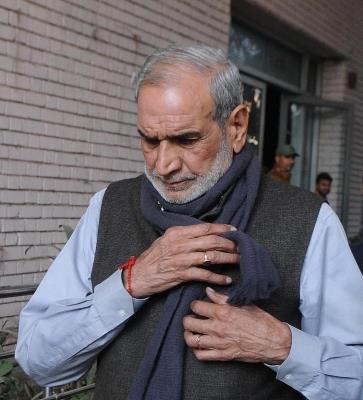
1984 Anti-Sikh Riots: Final Arguments In Case Against Sajjan Kumar To Be Heard At Rouse Avenue Court Today
On July 7, Sajjan Kumar declared himself innocent, stating that he could not have been involved in such crimes“even in his wildest dreams” and that there was no evidence against him. Earlier, on November 9, 2023, the victim in this case, Manjeet Kaur, recorded her statement before the court.
Sajjan Kumar, who was a Member of Parliament at the time of the riots, has been accused of inciting mobs to kill members of the Sikh community. In an earlier verdict, the Delhi High Court had delivered a scathing judgment, stating that the accused had managed to evade justice for decades due to“political patronage.”
The 1984 anti-Sikh riots broke out following the assassination of late Prime Minister Indira Gandhi by her Sikh bodyguards.
The assassination of the Prime Minister was triggered by widespread anger over Indira Gandhi's decision to order the Indian Army into the Golden Temple earlier that year to flush out terrorists hiding there.
Following her assassination, mobs targeted and murdered Sikhs, particularly in Delhi, where large-scale arson and killings occurred.
The violence, which spread across the country, claimed the lives of more than 3,000 Sikhs. The worst incidents took place in the national capital, Delhi, where more than 2,700 people were killed.
For over three decades, several high-profile politicians accused of involvement in the riots managed to escape conviction. However, this changed when Sajjan Kumar was convicted by the Delhi High Court, which sentenced him to life imprisonment. His lawyer, however, stated that Kumar would appeal the verdict before the Supreme Court.
There are multiple cases against Sajjan Kumar in connection with the 1984 riots, including one related to the killing of a family of five in Delhi. In the present case, Kumar faces charges for his alleged role in the murders of two Sikhs, Sohan Singh and his son-in-law Avtar Singh, in Janakpuri, as well as another incident in Vikaspuri, where one Gurcharan Singh was allegedly set ablaze.
Deposing before Special Judge Digvijay Singh of the Rouse Avenue Courts, the 77-year-old Kumar maintained that he had been falsely implicated and that the charges were politically motivated.
According to the Nanavati Commission report, constituted to investigate the violence, 587 FIRs were filed in Delhi relating to the riots, which resulted in the deaths of 2,733 people. Of these, about 240 FIRs were closed by police as“untraced,” while 250 cases ended in acquittals. Only 28 cases led to convictions, involving roughly 400 individuals, of whom about 50 were convicted for murder, including Sajjan Kumar.
Kumar, a senior Congress leader and MP at the time, was also convicted in another case concerning the killing of five persons in Delhi's Palam Colony on November 1 and 2, 1984. He was sentenced to life imprisonment by the Delhi High Court, and his appeal challenging the sentence is currently pending before the Supreme Court.

Legal Disclaimer:
MENAFN provides the
information “as is” without warranty of any kind. We do not accept
any responsibility or liability for the accuracy, content, images,
videos, licenses, completeness, legality, or reliability of the information
contained in this article. If you have any complaints or copyright
issues related to this article, kindly contact the provider above.


















Comments
No comment